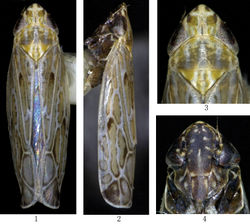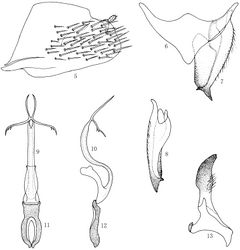Difference between revisions of "Multiproductus complantus"
m (Imported from ZooKeys) |
m (1 revision) |
(No difference)
| |
Latest revision as of 14:53, 13 January 2014
| Notice: | This page is derived from the original publication listed below, whose author(s) should always be credited. Further contributors may edit and improve the content of this page and, consequently, need to be credited as well (see page history). Any assessment of factual correctness requires a careful review of the original article as well as of subsequent contributions.
If you are uncertain whether your planned contribution is correct or not, we suggest that you use the associated discussion page instead of editing the page directly. This page should be cited as follows (rationale):
Citation formats to copy and paste
BibTeX: @article{Xing2014ZooKeys369, RIS/ Endnote: TY - JOUR Wikipedia/ Citizendium: <ref name="Xing2014ZooKeys369">{{Citation See also the citation download page at the journal. |
Ordo: Hemiptera
Familia: Cicadellidae
Genus: Multiproductus
Name
Multiproductus complantus Xing & Li sp. n. – Wikispecies link – ZooBank link – Pensoft Profile
Description
Yellowish-brown species, with light veins on forewings. Crown yellowish brown with four dark brown marks on anterior margin and orange–yellow longitudinal band midway between midline and eye extending to posterior margin of pronotum. Eyes black, fairly large. Ocelli pale yellow. Face black, frontoclypeus with yellowish brown transverse stripes on both sides. Forewings pale yellow. Hind macropterous. Legs marked with brown.
Head slightly wider than greatest width of pronotum. Vertex with fore margin produced triangularly, median length longer than width between eyes. Ocelli on anterior margin, separated from corresponding eye by approximately their own diameter. Frontoclypeus distinctly longer than wide, anteclypeus slightly narrowed apically. Antennae arising near lower corner of eye. Pronotum with anterior margin strongly and roundly produced, posterior margin slightly concave. Scutellum triangular, slightly shorter than pronotum, with transverse suture curved and depressed. Forewing with outer subapical cell extended to costal margin, branches of vein R recurved distally, resulting in fifth (outer) apical cell, and veins of clavus appear to extend to the claval suture, 4 times as long as wide, appendix present. Hind wings with three apical cells and two anteapical cells. Profemur with 2 dorsoapical setae. Hind femur apical setal formula 2+2+1. Hind tibia flattened and nearly straight, with PD setae very long, several supernumeral setae present between AD and AV rows; AD row with somewhat thin setae between very thick macrosetae. Metabasitarsomere with three platellae and two setae on apical transverse row; plantar surface with one row of five stout setae at middle and one row of four stout setae at lateral margin.
Male genitalia. Male pygofer side elongate with many large setae medially; without processes (Fig. 5). Valve subtriangular with anterior margin produced and posterior margin strongly produced medially (Fig. 6). Subgenital plate wide, with uniseriate row of macrosetae along lateral margin, internal appendage short and mucronate (Figs 7, 8). Aedeagal shaft elongate and sinuate; with two pairs of lateral preapical processes, proximal pair with two small spines; gonopore subapical on ventral surface (Figs 9, 10). Connective loop–shaped with arms fused apically; stem present, articulated with the aedeagus (Figs 11, 12). Apical process of style wide and flat, sword shape (Fig. 13).
Measurement
Length (including tegmen): ♂, 3.0 mm.
Host
Grasses.
Type material
Holotype ♂, China: Guizhou Prov., Ziyun County, Baishiyan, Kazha, 2 October 2013, coll. Jichun Xing (GUGC).
Diagnosis
This new species is similar to Multiproductus ramosus Xing, Dai & Li, 2011 in appearance, but can be distinguished from the latter by the aedeagal shaft with two pairs of lateral preapical processes, the apical process of style wide and flat, sword shape, and the valve subtriangular and subgenital plate wide.
Etymology
The species name is derived from the Latin word “complantus”, referring to the apical process of style wide and flat.
Original Description
- Xing, J; Li, Z; 2014: The leafhopper genus Multiproductus Xing, Dai & Li in China (Hemiptera, Cicadellidae, Deltocephalinae, Paralimnini), with description of one new species ZooKeys, 369: 43-48. doi
Images
|

